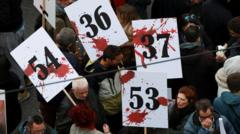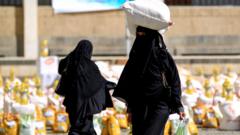The aftermath of a tragic railway station disaster in Novi Sad has prompted multiple arrests, including that of the former construction minister, as protests show no signs of abating. Citizens demand accountability from top officials amidst claims of systemic corruption.
Arrests Made in Wake of Novi Sad Railway Tragedy Amid Mass Protests

Arrests Made in Wake of Novi Sad Railway Tragedy Amid Mass Protests
Authorities in Serbia take action following the deadly roof collapse at Novi Sad's railway station, leading to public outrage and a demand for accountability.
Following a catastrophic roof collapse at a railway station in Serbia’s Novi Sad, which resulted in the deaths of 15 individuals, a wave of protests has swept the city, demanding accountability and justice. After three weeks of mounting public anger and demonstrations that drew over 20,000 participants, law enforcement officials have initiated the first arrests related to the disaster.
Prosecutors have begun questioning 11 individuals linked to the incident at the recently renovated station, which has become a focal point for public outcry against perceived negligence in infrastructure management. The collapse, which occurred earlier this month, left the city in mourning and ignited a debate over the alleged corruption in the state’s procurement processes.
Ex-construction minister Goran Vesic, who resigned his post in the immediate aftermath, has been detained but maintains his innocence, stating, "I cannot accept guilt for the deaths,” asserting that he bears no responsibility for the tragedy. Nevertheless, local authorities are keen on addressing what they describe as "criminal acts against public safety."
President Aleksandar Vucic has condemned the event during a recent address, emphasizing that the fatalities were not accidents stemming from individual fault but consequences of negligence in regulatory duties. Vucic, who has been personally linked to the station’s renovation due to its significance in his high-speed rail project from Belgrade to Budapest, now faces public scrutiny.
As reconstruction continues at the station, the disaster has been seen as a damning critique of the government's infrastructure policies, which have often been characterized by allegations of nepotism. Opposition leaders have seized the opportunity to criticize the ruling Progressive Party, with slogans like “corruption kills” resonating among protesters.
Public demand is growing not only for meaningful accountability but also for the resignations of key figures including Prime Minister Milos Vucevic and current official Milan Djuric. Without prompt judicial resolution, the situation may escalate further, leaving the government with a precarious political landscape to navigate in the ongoing aftermath of this tragic event.





















